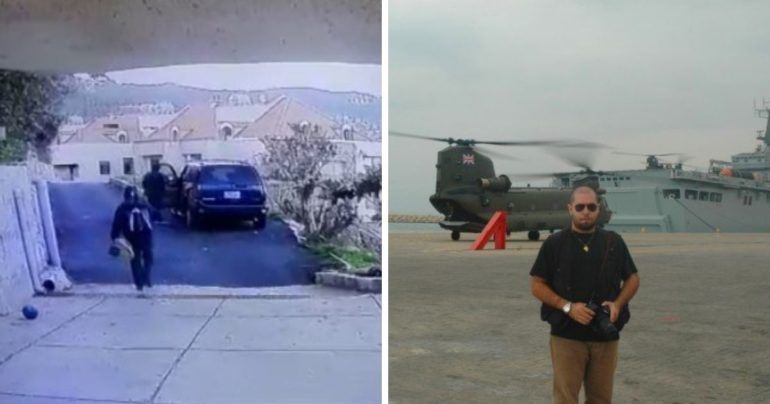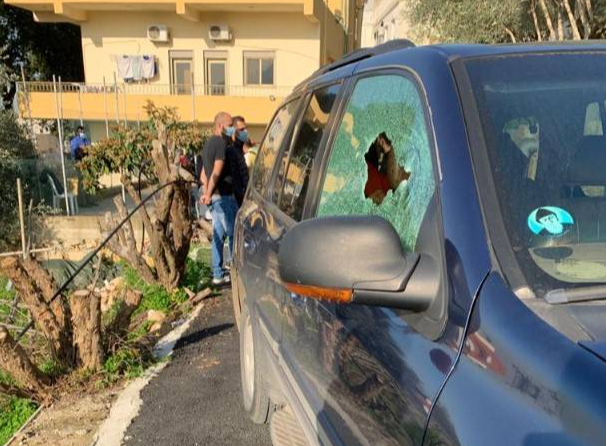Death of a Lebanese Photographer
 |
"The security and judicial agencies, as well as every official, must hasten to uncover the perpetrators and their backgrounds and impose the most severe penalties on them to avoid a return to the logic of self-defence and the complete dissolution of what remains of the state."Michel Moawad, former Lebanese Member of Parliament
 |
| Left, CCTV still Right, Joe Bejjany |
Preparing to drive his two daughters to pre-school, in the majority Christian mountain town of Kahaleh, photographer Joe Bejjany was shot to death with a silencer-equipped weapon. The motive is elusive, but hinted at. The 36-year-old, a Lebanese telecoms employee, freelance photographer and popular resident of the town seemed on the surface an unlikely target for those in the dark underground of a decayed civilization in utter thrall to a theocratic-inspired terrorist militia now essentially ruling Lebanon.
But rumours abound as they will in a country once renowned as the premier vacation resort of the Middle East where Christians, Shia and Sunni Muslims and Druze managed to work things out between them all, with a rotation of government positions and a wary, shared respect. Until Palestinians arrived, who fled into Lebanon when their leaders rejected the United Nations Partition Plan that would divide the area between Israel and the Palestinians led to a Muslim multi-army failed march on the nascent Jewish state.
The Islamic Republic of Iran saw an opportunity to mobilize Shi'ite Lebanese to advance their agenda in creating a Party of God militia answerable to the Quds Force of the Revolutionary Republican Guard Corps as a proxy army that could be used to bring Lebanon into the Iranian Shi'ite fold and threaten the existence of Israel. Hezbollah proved its mettle in the 1980s when it debuted its initial suicide truck bomb to kill hundreds of American troops at a U.S. army base in Lebanon, there on a UN peacekeeping mission.
Since then it has stored munitions, rockets, ammonium nitrate and other conflict-useful items, some of which it has used in its support role at Iran's behest, with Syrian President Bashar al-Assad in his deadly uncivil conflict with Sunni Syrians, and much of it destined -- as newer more advanced rocketry comes along supplied by Iran -- for an inevitable clash with Israel. Ammonium nitrate, used in bomb-making was stored for years in huge amounts at Beirut's harbour. Until it was sparked and the volatile stockpile detonated at the port.
Five months ago 200 people were killed by the immense fiery blast, injuring hundreds more, and ravaged areas of the capital city, adding to the financial meltdown of the country. Surveillance cameras outside the apartment building where Bejjani lived show a professional squad and a planned hit. Backs to the camera, the team appeared unfazed leaving fingerprints at the scene, eschewing gloves. They searched the car of the man they had just killed to retrieve his cell phone, leaving with it, toward a getaway vehicle.
 |
| Men carry the coffin of Joe Bejjany, a 36-year-old telecoms employee and freelance photographer, during his funeral in the village of Kahaleh |
Joe
Bejjani's former job at Alfa telecom was one of logistics, with no
access to security data. However, according to sources, he was one of
the first to arrive at the port following the deadly explosion, hired by
the Lebanese Army and the international committee set to investigate
the blast at the port to take forensic photographs. That, according to
growing public opinion, placed his life in danger. Former chief of the
drug control division at the Lebanese Customs, Colonel Joseph Skaff died
suspiciously in 2017.
The
Colonel had called for the removal of the 2,750 tons of ammonium
nitrate which had arrived at the Port of Beirut in 2013. He was ignored,
just as the managers at the port were ignored when they too recommended
the same, pointing out the potential danger in storing such
readily-ignited chemicals in such a sensitively vulnerable area,
threatening the well-being of dock workers and apartment dwellers living
nearby. What they had predicted and were helpless to prevent occurred
earlier this year.
Early
in December, Customs Col.Mounir Abou Rjeily, retired, but formerly
stationed at the Beirut port, was discovered dead in his Qartaba, Jbeil
home, from blows to the head by a blunt object, according to state-run
National News Agency. A high-ranking executive at Byblos Bank in June
was also found dead in the parking lot of his home in Hazmieh, Baabda.
He too died of a massive blow to the head. Needless to say, authorities
promise a thorough investigation in each of these cases.
Kahaleh's municipal chief has stated that no one among Joe Bejjany's friends or family was aware of threats or any enemies that might plan to do him harm. That he had never made any mention of anything that might conceivably have linked him to the port explosion. His daughters, aged two and four, found their father's body in the car minutes after the assassination had occurred. Mounir Bejjany, Joe's godfather spoke of the murder as "an assassination".
According to relatives, Joe had also photographed military events like parades as a freelancer while he worked at a mobile service provider. The murder was carried out in a professional manner, validated by two security sources. Neighbours wept and threw rice as men in suits carried a white coffin to the church at the Tuesday funeral. Gaby Feghall, Joe's cousin, said Joe had received approval to leave for Canada, about a week earlier. He himself was planning to leave Lebanon to escape the never-ending crises.
 |
| Joe Bejjany was shot as he was preparing to take his children to school Monday morning. (Credit: Lyana Alameddine/OLJ) |
Labels: Assassination, Beirut Port Blast, Dysfunction, Financial Meltdown, Hezbollah, Islamic Republic of Iran, Lebanon
0 Comments:
Post a Comment
<< Home